 Petzlover
Petzlover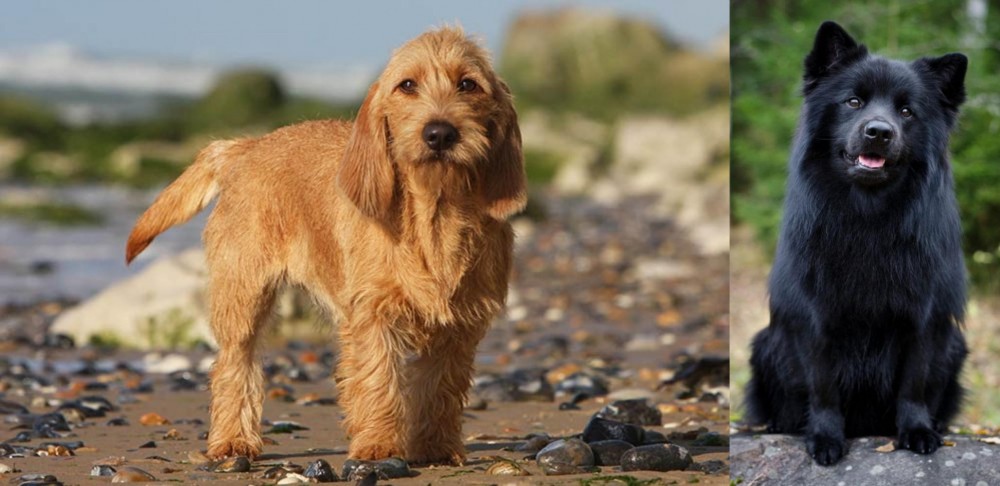 Griffon Fauve de Bretagne is originated from France but Swedish Lapphund is originated from Sweden. Both Griffon Fauve de Bretagne and Swedish Lapphund are having almost same height. Both Griffon Fauve de Bretagne and Swedish Lapphund are of same weight. Both Griffon Fauve de Bretagne and Swedish Lapphund has same life span. Both Griffon Fauve de Bretagne and Swedish Lapphund has almost same litter size. Both Griffon Fauve de Bretagne and Swedish Lapphund requires Moderate Maintenance.
Griffon Fauve de Bretagne is originated from France but Swedish Lapphund is originated from Sweden. Both Griffon Fauve de Bretagne and Swedish Lapphund are having almost same height. Both Griffon Fauve de Bretagne and Swedish Lapphund are of same weight. Both Griffon Fauve de Bretagne and Swedish Lapphund has same life span. Both Griffon Fauve de Bretagne and Swedish Lapphund has almost same litter size. Both Griffon Fauve de Bretagne and Swedish Lapphund requires Moderate Maintenance.
 The Griffon Fauve de Bretagne is one of the oldest scenthounds in France and has always been part of a pack when hunting wolves and wild boar.
The Griffon Fauve de Bretagne is one of the oldest scenthounds in France and has always been part of a pack when hunting wolves and wild boar.
Once wolves started dying out in the 19th century and the dogs were no longer needed, they nearly became extinct. Luckily in 1949, Marcel Pambrun founded the Club de Fauve de Bretagne to bring the breed back from extinction.
Hailing from France, the dog is still used as a hunting dog in the country but is considered rare outside of Europe.
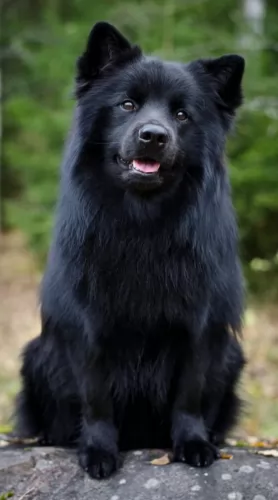 This is a Spitz type of dog from Sweden. It is Sweden’s national dog.The dog has always been used for herding and guarding livestock such as reindeer for the Sami people.
This is a Spitz type of dog from Sweden. It is Sweden’s national dog.The dog has always been used for herding and guarding livestock such as reindeer for the Sami people.
The dog is much the same as the Finnish Lapphund, and some even believe that it might be one and the same. The American Kennel Club recognizes them as two separate breeds.
It is one of the oldest Swedish dog breeds and also one of 3 Lapphund breeds.The Swedish Kennel Club recognized the Lapphund as a distinct breed in 1903.
The Federation Cynologique Internationale recognized this dog in 1944, and the United Kennel Club in 2006.
 Griffon Fauve de Bretagne are medium-sized muscular dogs standing at between 48 to 56cm and weighing in the region of 17 to 21 kg.
Griffon Fauve de Bretagne are medium-sized muscular dogs standing at between 48 to 56cm and weighing in the region of 17 to 21 kg.
The fur of this dog is a tawny, golden, orange shade and is shaggy and coarse, being longer around the face. Known also as the Fawn Brittany Griffon, this scenthound has floppy ears and a long tail carried somewhat up and in a slight curve.
The GFB as he is also sometimes known by, is an affectionate and loyal dog that loves spending time with his human family.
He is a social, friendly dog, and when he is socialized and trained, he becomes even more amicable. He has been bred as a working dog and while he loves to spend relaxing hours indoors, he is essentially a dog that loves to be out and about chasing after prey.
He is alert and intelligent and therefore makes a good watchdog. Your Griffon is energetic and active and will require lots of exercise. He will love coming on walks with you, but this won't be enough and he will require ball- and rope games as well as the chance to join you on your jogging or cycling outings.
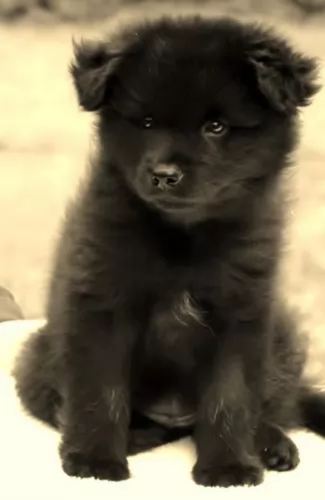 The Swedish Lapphund is a medium to large sized dog standing at between 40 to 51cm in height and weighing between 19 and 21kg.
The Swedish Lapphund is a medium to large sized dog standing at between 40 to 51cm in height and weighing between 19 and 21kg.
The head is wedge shaped and the ears erect. He has a thick double coat with fairly straight, silky hair that stands out from the body. Colors can be brown or black and sometimes there can be white markings. He sheds quite a bit, with some heavier seasonal shedding.
When you get one of these Spitz type dogs as your pet, you can be sure that you’re going to have an excellent pet and companion.
They’re independent dogs with strong wills and like to do their own thing. Training and socialization can change that and make him easy, well mannered and obedient.
They’re lively dogs and intelligent too. He is versatile, loving to be outdoors and being energetic with the children but being able to enjoy some quiet time indoors too. He is simply an excellent family pet and watchdog.
 You won't find a better canine friend than the Griffon Fauve de Bretagne, once known as the Grand Fauve de Bretagne.
You won't find a better canine friend than the Griffon Fauve de Bretagne, once known as the Grand Fauve de Bretagne.
They have always loved their role as working- and hunting dog but when they're in the company of their human owners, they are loyal and loving, wanting to please.
This good nature of theirs sees them getting on well with other pets in the home as well as with children.Your golden Griffon Fauve De Bretagne is such a friendly, sociable dog and this is what makes him such a popular and sought after family pet.
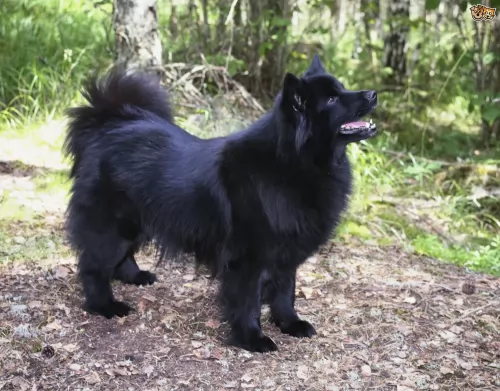 The Swedish Lapphund has always been a hardworking dog, herding reindeer for the Sami people.
The Swedish Lapphund has always been a hardworking dog, herding reindeer for the Sami people.
Today the Lapphund is a people-loving dog and wants to be constantly with his human family. He is intelligent, strong, independent, loyal, bold and loving. If you’re looking for an excellent family companion, this is it.
Do him a favor and don’t leave him outside without human companionship as he will become run-down and possibly destructive through no fault of his own. Bring him into your family and make him part of it and then he’s happy.
 Capable of reaching 10 to 13 years of age with good care, the Griffon Fauve de Bretagne isn't likely to cause you too much concern with dog illnesses, but there are those common dog illnesses that are worth knowing about because they affect so many dogs.
Capable of reaching 10 to 13 years of age with good care, the Griffon Fauve de Bretagne isn't likely to cause you too much concern with dog illnesses, but there are those common dog illnesses that are worth knowing about because they affect so many dogs.
This is such a common dog ailment that it requires mentioning every time. It's a condition where the hip joint bones don't fit properly, resulting in unnatural wear and tear which ultimately leads to pain and arthritis.
Sometimes it takes a while for the illness to become evident and you'll notice your pet being loathe to take part in the games he loves so much or battling to get up after lying down. It can start in a young dog and will require vet intervention.
Keep an eye on your dog for other common illnesses such as eye diseases, skin allergies and bloat, a disease which can be life-threatening and where the stomach of your dog swells up.
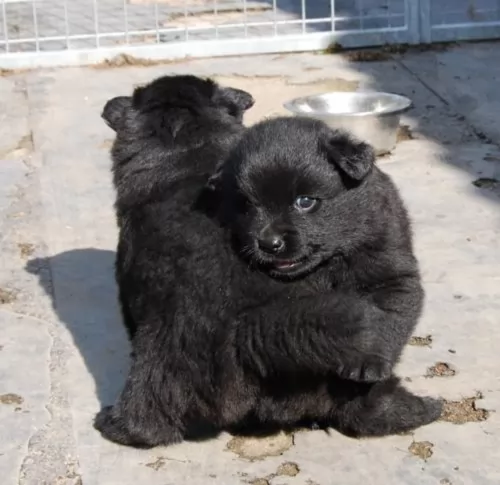 The Swedish Lapphud is a healthy dog breed, but even so he can get one of the many common dog illnesses there are.If you choose a puppy, make sure to get your pet from a reputable breeder to avoid more serious dog illnesses.
The Swedish Lapphud is a healthy dog breed, but even so he can get one of the many common dog illnesses there are.If you choose a puppy, make sure to get your pet from a reputable breeder to avoid more serious dog illnesses.
Diabetes Mellitus is a disease you might have to watch out for with this dog breed.
This is a disease of the pancreas. This organ has two groups of cells – one produces enzymes for proper digestion and the other produces the hormone insulin which regulates the level of glucose in the bloodstream.
Diabetes is when the pancreas fails to regulate blood sugar. Your dog will have increased thirst and urination, weight loss, and increased appetite.
Type I diabetes mellitus results from destruction of the insulin-producing beta cells, which is the most common type of diabetes in dogs. Dogs with this type of diabetes require insulin injections to stabilize blood sugar. Type II diabetes is more likely in older, obese dogs.
Dogs with diabetes mellitus will require insulin each day. If canine diabetes mellitus is properly regulated, prognosis for the dog is good.
 Your GFB, with his shaggy coat, will need a brush a couple of times a week and nothing much more, being looked upon as a fairly low maintenance breed.
Your GFB, with his shaggy coat, will need a brush a couple of times a week and nothing much more, being looked upon as a fairly low maintenance breed.
He will require you checking inside his ears to ensure he is free of infection. You will need to have his nails trimmed if he doesn't wear them down himself and he will need to have his teeth brushed at least 2 or 3 times a week with special dog toothpaste- and toothbrush.
As a medium sized dog, the Griffon Fauve de Bretagne will need a high-quality dog food full of all the right vitamins and minerals to ensure health and a long life.
He is a hunting dog so you want to make sure that protein is listed high on the ingredients list of his food packaging. You can vary his diet by adding in homemade fare such as cooked chicken, rice and vegetables and you can also try to include some raw meat into his diet too. This raw meat plays an important role in preventing skin allergies.
Never leave him without a bowl of fresh, cool water.
Ensure your 4-legged friend has a nice dry, warm spot with clean blankets to sleep on.
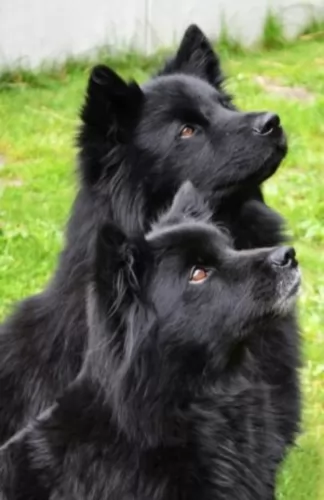 ●The Swedish Lapphund is an active dog and will require a high quality dog food. If you buy commercially manufactured dog food it should be appropriate to your dog’s age and activity levels.
●The Swedish Lapphund is an active dog and will require a high quality dog food. If you buy commercially manufactured dog food it should be appropriate to your dog’s age and activity levels.
Home-made food like boiled chicken, brown rice, spinach and sweet potatoes will do your pet the world of good, and chopped up, it can be added a couple of times a week to the dog’s dry kibble.
Try and feed some raw met occasionally as well. Clean, fresh water should be available at all times.
●The Lapphund is an active dog and he is going to reguire daily exercise that will keep him mentally and physically fit. Having a dog like this requires you being active yourself, and your Lapphund is going to love going on long walks or hikes. He will never get enough games with the children – he just loves the rough and tumble.
● Have his vaccines attended to. There are training classes as well as boarding kennels that won’t accept your dog unless his vaccines are up to date.
● Have your dog spayed or neutered if you don’t want your dogs to have puppies.
● Brush his coat twice a week. Check inside his ears and inside his mouth for redness and infection.